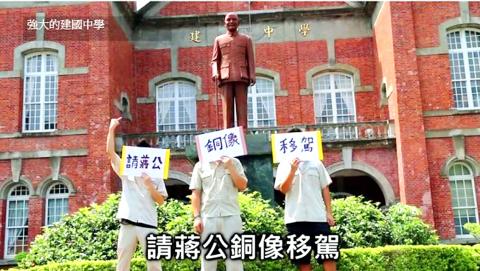A group of high-school students from across the nation has launched a campaign advocating the removal of statues of Chiang Kai-shek (蔣介石) from all campuses nationwide, announcing their initiative through a video released on Monday.
Taipei Chenggong High School (成功高中) started filming the clip and was later joined by various high schools, including Taipei Municipal Jianguo High School (建國中學), Taipei First Girls’ High School (北一女中), the Affiliated Senior High School of National Taiwan Normal University (師大附中), National Tainan Girls’ Senior High School (台南女中) and St Ignatius High School (徐匯中學).
The video’s release was timed to coincide with the 27th anniversary of the end of the Martial Law era on July 14, 1987.

Photo taken from YouTube
Titled 7/14 Beginning of our modern democracy, banish all Chiang statues from school campuses, students say in the three-minute video that it is time to do away with reverence for Chiang’s authoritarian rule at schools.
They joined up with fellow students currently enrolled at several leading high schools. Filmed on location, the video aims to show viewers that at these schools, statues of Chiang, symbols of his authoritarian rule and the Martial Law era are still displayed prominently.
Holding placards, the students are seen standing in front of a Chiang statue at Taipei Municipal Jianguo High School saying: “July 14. On this day, the government order to abolish martial law was made. It marked the end of authoritarian rule and the start of Taiwan’s modern democracy.”
“Although the era of authoritarian rule has ended, its legacy in the form of Chiang Kai-shek statues is still in place at many schools and university campuses. We believe it’s time to remove them from all schools so ‘transitional justice’ can be achieved,” they say in the video.
“After July 14, we have our current democracy, freedom and human rights. These were fought for and gained by the democracy activists of yesteryear. Let us all commemorate this day together,” they add.
“Although Chiang made contributions to the Republic of China [ROC], he imposed martial law and the ‘White Terror,’ severely violated human rights and repressed democracy and freedom. All these are contrary to the ideals of ROC founding father Sun Yat-sen (孫中山),” the students added.
“Why is Hitler repudiated by people everywhere, but Chiang Kai-shek is still worshiped here? We do not have to track down who was responsible for past crimes, but why does Chiang’s statue still stand at schools? The man denied the people democracy, freedom and human rights. Why should people pay respect to him?” they said.
Near its end, the video lists the names of victims of Chiang’s White Terror era, while the song used by the government to commemorate the late leader plays ironically.
The students said they want Taiwanese to remember that the democracy they enjoy today was won by the blood, sweat and sacrifice of many activists.
“We can forgive, but must not forget history. The fight against authoritarianism starts on school campuses. So let’s remove all Chiang’s statues from schools,” they said.

DAREDEVIL: Honnold said it had always been a dream of his to climb Taipei 101, while a Netflix producer said the skyscraper was ‘a real icon of this country’ US climber Alex Honnold yesterday took on Taiwan’s tallest building, becoming the first person to scale Taipei 101 without a rope, harness or safety net. Hundreds of spectators gathered at the base of the 101-story skyscraper to watch Honnold, 40, embark on his daredevil feat, which was also broadcast live on Netflix. Dressed in a red T-shirt and yellow custom-made climbing shoes, Honnold swiftly moved up the southeast face of the glass and steel building. At one point, he stepped onto a platform midway up to wave down at fans and onlookers who were taking photos. People watching from inside

A Vietnamese migrant worker yesterday won NT$12 million (US$379,627) on a Lunar New Year scratch card in Kaohsiung as part of Taiwan Lottery Co’s (台灣彩券) “NT$12 Million Grand Fortune” (1200萬大吉利) game. The man was the first top-prize winner of the new game launched on Jan. 6 to mark the Lunar New Year. Three Vietnamese migrant workers visited a Taiwan Lottery shop on Xinyue Street in Kaohsiung’s Gangshan District (崗山), a store representative said. The player bought multiple tickets and, after winning nothing, held the final lottery ticket in one hand and rubbed the store’s statue of the Maitreya Buddha’s belly with the other,

‘NATO-PLUS’: ‘Our strategic partners in the Indo-Pacific are facing increasing aggression by the Chinese Communist Party,’ US Representative Rob Wittman said The US House of Representatives on Monday released its version of the Consolidated Appropriations Act, which includes US$1.15 billion to support security cooperation with Taiwan. The omnibus act, covering US$1.2 trillion of spending, allocates US$1 billion for the Taiwan Security Cooperation Initiative, as well as US$150 million for the replacement of defense articles and reimbursement of defense services provided to Taiwan. The fund allocations were based on the US National Defense Authorization Act for fiscal 2026 that was passed by the US Congress last month and authorized up to US$1 billion to the US Defense Security Cooperation Agency in support of the

‘COMMITTED TO DETERRENCE’: Washington would stand by its allies, but it can only help as much as countries help themselves, Raymond Greene said The US is committed to deterrence in the first island chain, but it should not bear the burden alone, as “freedom is not free,” American Institute in Taiwan Director Raymond Greene said in a speech at the Institute for National Defense and Security Research’s “Strengthening Resilience: Defense as the Engine of Development” seminar in Taipei yesterday. In the speech, titled “Investing Together and a Secure and Prosperous Future,” Greene highlighted the contributions of US President Donald Trump’s administration to Taiwan’s defense efforts, including the establishment of supply chains for drones and autonomous systems, offers of security assistance and the expansion of